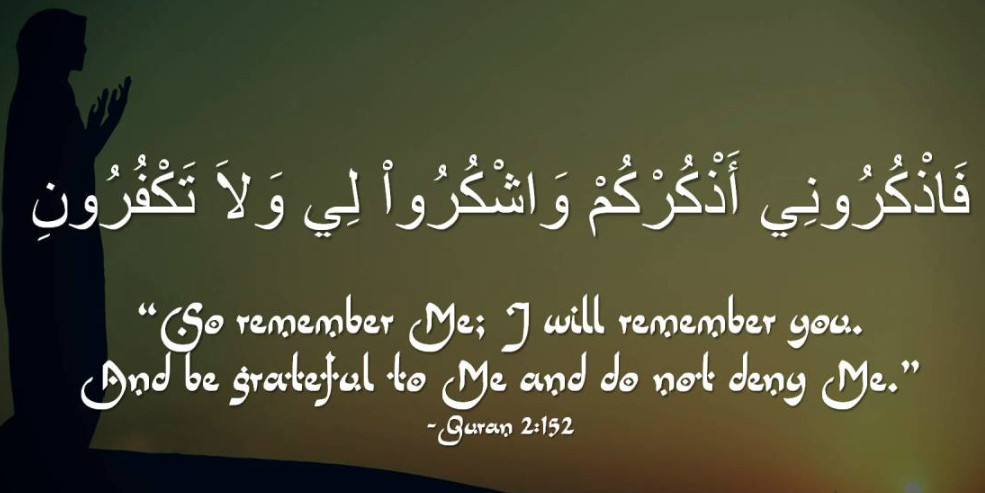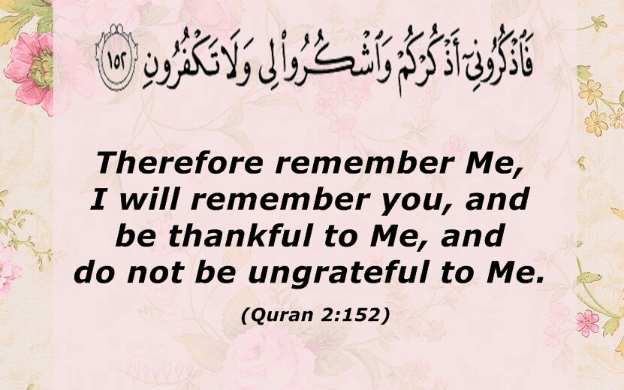A little reflection follows on the below ayah,
فَاذْكُرُونِيأَذْكُرْكُمْ وَاشْكُرُوا لِيوَلَا تَكْفُرُونِ
Therefore remember Me,I will remember you,and be thankful to Me,anddo not beungratefulto Me.
[Quran, 2:152]
When we think about something we need, we usually cannot overcome that thought until the perceived need is satisfied.
For example, if we need food or water, our minds constantly think about how hungry or thirsty we are until we have something to eat or quench our thirst.
Similarly, one who understands how much he or she is in need of God will constantly think about God. When we have faith and the desire to receive God's grace and mercy, we will turn to the remembrance of Him.
The importance of remembrance and how we can better use it to improve our health and lifestyle. By remembering our creator and expressing gratitude.
The Arabic term for remembrance is dhikr, which inspires us to do good, but it also heals, energizes, and transforms our lives. When engaging in dhikr, we feel more forgiving and enthusiastic.
Dhikr is the adhesive that binds the mind and heart together. It serves as a key link in the dynamic between praising God and receiving blessings from Him.
"Remember Me, and I Will Remember You"
Prophet Muhammad was famously known to have said :
"Shall I tell you about the best of deeds, the most pure in the Sight of your Lord, about the one that is of the highest order and is far better for you than spending gold and silver, even better for you than meeting your enemies in the battlefield where you strike at their necks and they at yours?" The companions replied, "Yes, O Messenger of Allah!" said, "Remembrance of Allah (Sunan al-Tirmidhi).
Allah ‘azza wa jall mentioned His reciprocation of our actions in the first part:
when we remember Him (in praising and supplicating), He will remember us (in bestowing upon us His blessings and mercy). It is our right to reciprocate His blessings and favours with thankfulness and appreciation, just as He remembers us when we call on Him. We must thank Him for His favours without disacknowledging their significance, and we must do so on a regular basis.
God comes to us when we seek Him, He does not ignore or overlook us calling upon Him, despite His greatness and supremacy. So we too, as mere humans, cannot ignore or overlook His favours to us, and we cannot deem ourselves above acknowledging and appreciating them.
In the commentary of this ayah in Ma’ariful Quran, the author (rahimahullah) says:
“The merits of Dhikr are, indeed, innumerable. What greater merit could one wish for than the assurance that when a man “remembers” Allah, He too “remembers” him.
Abu ‘Uthman once claimed that he knew the time when Allah remembered His servants. The listeners grew curious as to how he could determine this.
He replied that, according to the promise made in the Holy Qur’an, when a Muslim remembers Allah, He too remembers him, and thus everyone can know for himself that as soon as he turns to Allah and remembers Him, Allah too remembers him.
Let us add that Verse 152 means to say that if men “remember” Allah by obeying His commandments, He will “remember” them by granting His pardon and His rewards. The commentator Sa’id ibn Jubayr has, in fact, interpreted the Dhikr or “Remembrance” of Allah as obedience and submission to Him.”
The matter is also explained in Fee dhilal al-Quran
“This passage is concluded with yet another reminder of God’s favours to the Muslim community. God calls on Muslims to remember and praise Him, and inreturn He will remember them:
“Remember Me, then, and I will remember you; give thanks to Me and never deny Me.’’ (Verse 152)
What honour, what benevolence and compassion! God Almighty, in all His greatness and glory, exchanges these sentiments on an equal level with His humble servants. What grace and generosity!
“Remember Me, then, and I will remember you” — it is the greatest privilege any human being can receive from God, whose generosity is limitless and whose benevolence knows no bounds.
The Prophet Muĥammad is reported to have quoted God as saying: “Whoever remembers Me privately to himself I will remember him to Myself; and whoever remembers Me in the company of people I will remember him in a better company.”[1]
No words could possibly describe the effects and scope of this divine grace. Man can only reciprocate such feelings through prayer, meditation and total submission to God Almighty. This will eventually lead him to see and recognize no other power in this world but that of God.
[1] Hadeeth recorded in Sahih al-Bukhari, Sahih Muslim and Riyaad us-Saaliheen
How often have we called upon Allah ta’ala for help and support, for guidance, for consolation?
How often did we receive Allah’s favour and mercy, in ways that we could understand, and at other times, ways that we could not imagine?
Yet how often do we remember Him when we are in a state of sufficiency, a state of happiness and contentment?
Is our love for our Rabb restricted only to when times are bad?
Through the recitation of adhkaar (words of remembrance), we can open our minds to a more regular appreciation of the mercies of Allah ‘azzawajal, we can remember to remember Him in both times of difficulty and contentment, we can build on our relationship with our Creator, Nourisher, Sustainer, Provider, Guider, Helper, Consoler.
We can acquire a greater appreciation for His blessings, and try to remember Him often in hope of the fulfilment of this promise of “Remember Me, I will remember you”.
What more could we want? Undeniably, it is true that:
Quran, 13:28
أَلَا بِذِكْرِ اللَّهِ تَطْمَئِنُّ الْقُلُوبُ…
…Verily, in theremembrance ofAllah do hearts find rest.
Yet despite the fact that to reciprocate our remembrance of Him is of no benefit to His majesty, despite Him being unaffected either way, Allah ta’ala, ar-Raheem, still shows us benevolence and generosity through this favour.
Quran often reminds us to keep remembrance of Allah (Dhikr) at all times. Certainly this is quite a challenge for us forgetful humans to do Dhikr of Allah, but the merits of remembrance/ Zikr are so great that we must strive for continual remembrance of Allah in every moment. Remembrance of Allah (Zikr) is one of the easiest forms of worship, the mercy and honor that it brings cannot be achieved by any other means.
Allah (Subhaanahu wa Ta’aala) says:
“Therefore remember Me, I will remember you and be grateful to Me, and never be ungrateful to me” [Soorah al-Baqarah, Aayah 152]
“O you who believe! Remember Allah with much remembrance” [Soorah al-Ahzaab, Aayah 41]
“And for men and women who engage much in Allah’s remembrance, for them has Allah prepared forgiveness and great reward” [Soorah al-Ahzaab, Aayah 35]
“And bring your Lord to remembrance in your [very] soul, with humility and remember without loudness in words, in the mornings and evenings; and be not of those who are unheedful” [Soorah al-A’raaf, Aayah 205]
Importance of Remembrance:
- The Prophet (P.B.U.H) said:”The comparison of the one who remembers Allah and the one who does not remember Allaah, is like that of the living and the dead” [al-Bukhaaree, Muslim 1/539]








/image%2F1677428%2F20200508%2Fob_4bf1c9_hudhud.jpg)
/image%2F1677428%2F20200425%2Fob_3d9c0c_p48.jpg)
/image%2F1677428%2F20200409%2Fob_6a774c_8787600d-b8d5-46c1-a8b5-7523bda906dd.jpg)
/image%2F1677428%2F20190714%2Fob_9e3bfe_screen-shot-2019-07-14-at-5-13-26-pm.png)